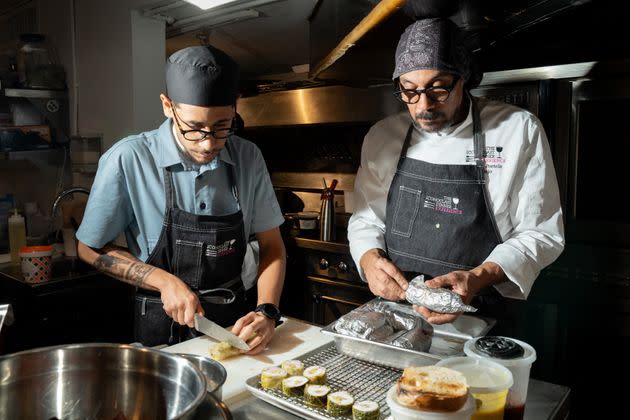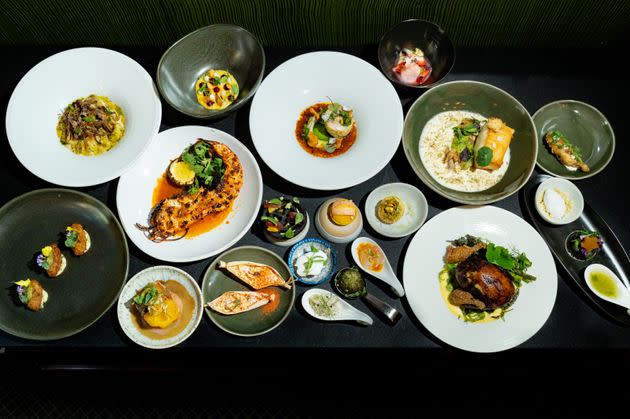How Chef Carlos Portela Captures The Real Puerto Rico On A Plate
!["Our job is to absorb [our] energy, place it on a dish and bring it to the people," says chef Carlos Portela, pictured here to the right of sous-chef Christian. <span class="copyright">Photo: Victoria Leandra</span>](https://s.yimg.com/ny/api/res/1.2/4Mp6GW9fotVpqCYPnKx86Q--/YXBwaWQ9aGlnaGxhbmRlcjt3PTEyNDI7aD05MzE-/https://media.zenfs.com/en/the_huffington_post_584/ee8e543b1c08dea87583d7b87b8fbdd2)
AsIwalk into chef Carlos Portela’s restaurant, Orujo, nestled in the swanky restaurant district of Miramar in San Juan, Puerto Rico, I’m greeted at once by John Lee Hooker’s blues. It shatters any expectations I had for a sterile environment often associated with fine-dining establishments in this area. The music sets the tone for what will be a truly immersive and sensorial experience, crafted by a chef whose every move is both intentional and, when it needs to be, playfully improvised.
Portela doesn’t use the term “restaurant” to describe this place. Instead, he sees it as a workshop of sorts, where food, wine and community converge to create a one-of-a-kind encounter. With only seven tables, the space feels intimate, full of reflections of his life and passions. Local art by fellow chefs adorns the walls, and in the corner is a small library of lovingly annotated books about food. His children’s tennis shoes are hung on the ceiling — a familiar sight in the barrios of the island — in a tribute to his family.
It’s evident that Orujo is unapologetically Boricua. Portela’s lack of desire to conform to what it may mean to be a “fancy chef” is baked into Puerto Rican culture: We are proud of our vulnerability, our roots and our lack of pretense. There is no formal marketing for Orujo — its popularity spreads purely by word of mouth, enhancing the restaurant’s mystique of “el que sabe, sabe” (“if you know, you know”).
Portela and sous-chef Christian handle everything at Orujo. When diners come in, Portela introduces himself as “chef, owner and dishwasher,” and he personally greets diners and serves each course, explaining the ingredients and preparation.
His philosophy of the culinary experience — which includes relaxing into dinner as a multihour experience — ensnared me, and everyone who dined around me that evening. Starting in what he calls “an underground dining club” in a garage in his hometown of Caguas, Portela went on to develop his concept in a more formal space, ultimately relocating to his current locale in the Puerto Rican capital three years ago. In his kitchen, there are no boisterous “Yes, chefs” — only gentle murmurs of communication that complement the progression of several courses.
“You know the concept now; there’s no turning back,” he says with a knowing smile. “Our specialty, in a way, is our inconsistency. There’s not a day in which you’ll be served the same dish twice.”
Portela has worked everywhere from hot dog stands to Michelin-starred restaurants in Spain, and his breadth of work is evident in the playfulness of his cooking style. But beyond his experience, his foundation is rooted in a deep and genuine understanding of food science and the culture of the island.
Each creation features at least one local ingredient as the star, such as guanime with lobster, cojinúa with apio, and breadfruit mofongo with local pork. “I can present you oscietra caviar from Russia served with malanga puree,” he says. “But the dish’s hero is the malanga, not caviar.” Malanga, also known as yautía, is not a delicacy — it’s a staple in Puerto Rican households, tracing back to the diets of the Indigenous Taíno people.
Portela’s courses come in the form of “fabrications,” which are, as he says, “an ecosystem of ingredients that build upon each other.” His methodology is highly improvisational — adapting based on the local ingredients at hand, along with meticulous control of temperatures, and taking factors like weather, barometric pressure and the freshness of herbs into consideration — which keeps both him and his guests on their toes.
Visitors have no idea what they will be served, relying entirely on Portela’s expertise and vision. As one might imagine, his approach was not always well received when he was a young chef.
“Diners would leave because there was no menu,” he recalls. But persistence paid off, and now guests trust him implicitly, ready to join him for the ride without a road map.
He brought that exact energy to New York City in June for the Iconoclast Dinner Experience, an annual culinary event at the James Beard House that features some of the most innovative and influential chefs from around the world. The dinner — where chefs showcase their unique culinary visions, collaborate with peers and push the boundaries of gastronomy — is an opportunity to influence and inspire the future of dining.

It’s part of a series of culinary events created and curated by pediatric dentist Dr. Lezli Levene Harvell, bringing together outstanding chefs and sommeliers of color to train with one another and present innovative dishes that reflect their culture.
The net proceeds from the dinner, which harmoniously aligns with Portela’s commitment to community, go toward grants for students of Jamaican and sub-Saharan African descent at Spelman College, Harvell’s alma mater.

At this year’s dinner, Portela and his cohorts each prepared a course inspired by their culture and experiences, and emerged from the kitchen to speak briefly about it to guests as their course was being served. Portela’s presentation included a lightly cured bluefin tuna with oranges and purslane, among other immaculately plated dishes that tickled all the senses.
“I want to create links and overcome boundaries,” Portela says when I ask him about expressing his identity in the kitchen. “I’d like to concentrate on making sure my representation is as good as the next chef beside me, that the synergy exists while cooking and that we can beautifully integrate each other’s energy and different cultures into every dish.”

Portela has devoted years to experimentation, even on his own farm, refining his use of plants that have grown on his island for centuries. At Orujo, he only uses wood fire, varying temperatures to dehydrate, cure, smoke, preserve and ferment for flavor experimentation. It’s an exercise in refinement, he tells me. At the Iconoclast Dinner, he chose ingredients that did more than transport guests to his island; each bite was a master class in what it meant to honor his land and the people who make it a uniquely exquisite food destination.
In conjunction with his commitment to local ingredients, his cooking style underscores his dedication to sustainability and zero-waste practices. “I am not presenting the ingredient; I am glorifying the harvest of our island,” he says.
Despite his accolades, including a recent James Beard Award nomination in the Best Chef: South category, Portela remains down-to-earth, inviting guests into the kitchen to witness his “alchemy” behind the scenes.
“Our job is to absorb [our] energy, place it on a dish and bring it to the people,” Portela says, describing cooking as the “denaturation of ingredients through transformation with energy.” For him, cooking is a spiritual process, transferring experiences and feelings into each dish. And that’s what he aims to evoke at Orujo and in any kitchen he finds himself in.
“I still pinch myself,” Portela says. “To be included alongside your heroes, and people who have inspired you, we are still in shock. My family and I already feel like winners.”

